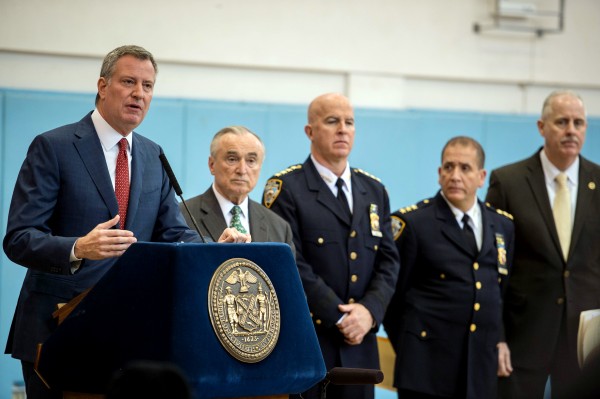
Mayor Bill de Blasio on Tuesday detailed his administration’s new plan to reduce crime, and reduce the number of people with mental-health issues behind bars.
Photo Courtesy of Demetrius Freeman/Mayoral Photography Office
Fresh on the heels of glowing CompStat reports that indicated that the city just experienced the safest August through November period since modern crime statistics begin in 1993, Mayor Bill de Blasio this week released the report of his Task Force on Behavioral Health and the Criminal Justice System, which he called “a comprehensive roadmap to continue to drive down crime while also reducing the number of people with behavioral health issues needlessly cycling through the criminal justice system.”
The $130 million, four-year investment is a component of the administration’s efforts to reduce what it has characterized as “unnecessary arrests and incarceration,” direct criminal justice resources to where they will have the greatest public safety impact, and make the system fairer. The Manhattan District Attorney’s Office contributed $40 million to the Behavioral Health and the Criminal Justice System Action Plan, with the remaining $90 million coming from city funds.
The task force spent 100 days developing interlocking public health and public safety strategies that address each point in the criminal justice system and the overlap among those points. The recommendations of the task force, de Blasio said, focus on ensuring that, when appropriate, individuals with behavioral health disorders: do not enter the criminal justice system in the first place; if they do enter, that they are treated outside of a jail setting; if they are in jail, that they receive treatment that is therapeutic, rather than punitive; and that upon release, they are connected to effective services.
Major initiatives of the plan include: Expand training for police officers and encourage diversion to services, instead of arrest, for people who do not pose a public safety threat; expand supervised release, develop risk assessment tool, pursue bail reform strategies, and reduce case processing times; expand access to effective treatment in jail; and expand re-entry services and supportive housing to set people up to never return to jail.
“For years, the criminal justice system has been the default for dealing with behavioral and mental health issues, but that approach alone does not best serve public health or public safety,” de Blasio said. “This comprehensive plan to identify and divert individuals out of the criminal justice system and connect them with treatment and services to address their underlying issues will mean not only safer streets, but stronger neighborhoods and healthier people.”
City Councilwoman Elizabeth Crowley (D-Glendale), chairwoman of the Committee on Fire and Criminal Justice Services, added, “I applaud the de Blasio administration for understanding that addressing the mental health needs of New York’s inmate population is an important part of improving public safety. These proactive reforms will reduce recidivism and save taxpayer dollars by providing those entering the criminal justice system with the right mental health and substance abuse services. I look forward to working with [city Department of Correction] Commissioner [Joseph] Ponte to ensure that these reforms are effective in curbing violence and ending business as usual on Rikers Island.”
By Michael V. Cusenza
